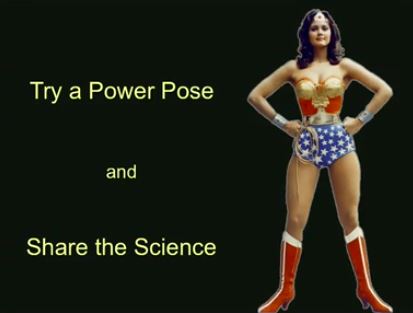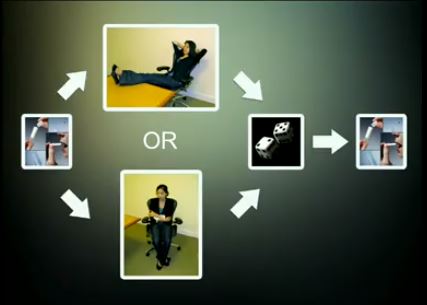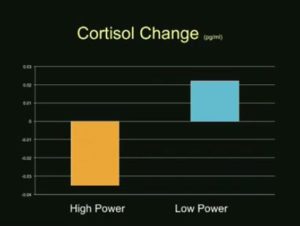The Big Idea: Amy Cuddy shares how “power posing,” standing or sitting in a posture of confidence, even when you don’t feel confident, can affect testosterone (dominance hormone) and cortisol (stress hormone) levels in the body, causing you to feel and be perceived as more confident. It’s not “fake it till you make it.” It’s “fake it till you become it.”
The overall construct of the speech: A persuasive, informative speech, supported by research.
Not perfect: Amy Cuddy’s talk was so inherently interesting and her style so authentic, that it was easy to overlook imperfections on the first viewing. On the second viewing, I took notes.
Most noticeable, given the subject of her talk, were indications of insecurity:
1. Filler words: uh, um. She had a couple dozen of these. Noticeable, but generally not distracting in a 21 minute talk. She also used quite a few “so” and “and” connecting words.
2. Touching her face/chin. She touched her lower face/chin a half-dozen times. The reasons for this seemed to be that she needed a moment to compose herself (in an emotional part of her speech), or she used the gesture to gather her thoughts, or she might have had a slightly dry mouth.
Emotional control:
composing thoughts:
3. Hair in face. Her hair style, which may have simply been a style choice, hid part of her face. When I see women (or men) with hair over part of their faces, I wonder if they are trying to hide themselves. Plus, when the audience can’t see your face, you’ve lost some connection.
4. Fast-paced, with sniffing breaths. Her overall pace was rather fast and often punctuated by quick breath intakes through her nose. On one hand, it was good for her vocal cords to breath through her nose rather than her mouth (breathing through your mouth can dry out your vocal cords), but on the other hand it did make her quick breaths more noticeable. She could have slowed down and have taken longer breaths.
5. Slightly hunched posture. Her posture was slightly hunched at the shoulders, giving her a slightly defensive look. Related to this was her overall tucked-elbow gesturing. She rarely was expansive with her gestures.
And now, I will reveal a bias, which I’m pretty sure most people share: I am more critical of a woman’s appearance than a man’s. Amy Cuddy is a beautiful woman. More than once I thought, “She has flawlessly beautiful skin.” I also found myself critiquing her classy outfit. “That black makes her fade into the background . . . her wide necklace cuts her off at the throat . . . that lipstick is too purple.”
I took away a personal lesson from my realization of my bias: As a woman, I really do need to pay closer attention to my appearance than a man! It might not be fair, but that’s how it is.
Enough of the trivial critique. Amy Cuddy really did hit it out of the ball park with this talk.
What the speaker nailed:
Gave a practical take-away from research. After supporting her point that your body language not only affects what people think about you, but what you think about yourself (and that you can change your thoughts by changing your pose), she gave a call to action: Try a power pose and share the science. She proved that this was practical advice with her research results on power posing before job interviews.
Engaged the audience’s imagination.
“Imagine this was the person interviewing you” and showing a picture of an expressionless interviewer.
Used simple visuals, mostly pictures.
She started her talk with some humorous visuals of body language, which relaxed the audience (and probably her, also).
This was probably one of the more complicated visuals, which explained how the experiment was conducted in which cortisol and testosterone levels were measured after either low or high power poses:
As might be expected, some of the research results were shown in graphical form:
Arrows in the colored bars would have more clearly indicated a decrease or increase of cortisol (high power poses decreased the level of cortisol, the stress hormone and low power poses increased it).
Was vulnerable and preemptively addressed a common objection.
The idea of “fake it till you make it” can lead to the objection of “I don’t want to feel like an impostor.” She addressed that objection head-on with a personal story, that at one point made me tear up, and made the audience break out into applause. If you don’t have time to watch the whole video, at least watch this story (from 16:12-19:28).
The Big Take Away (especially applicable to public speaking): Fake it till you become it!
Next week:







